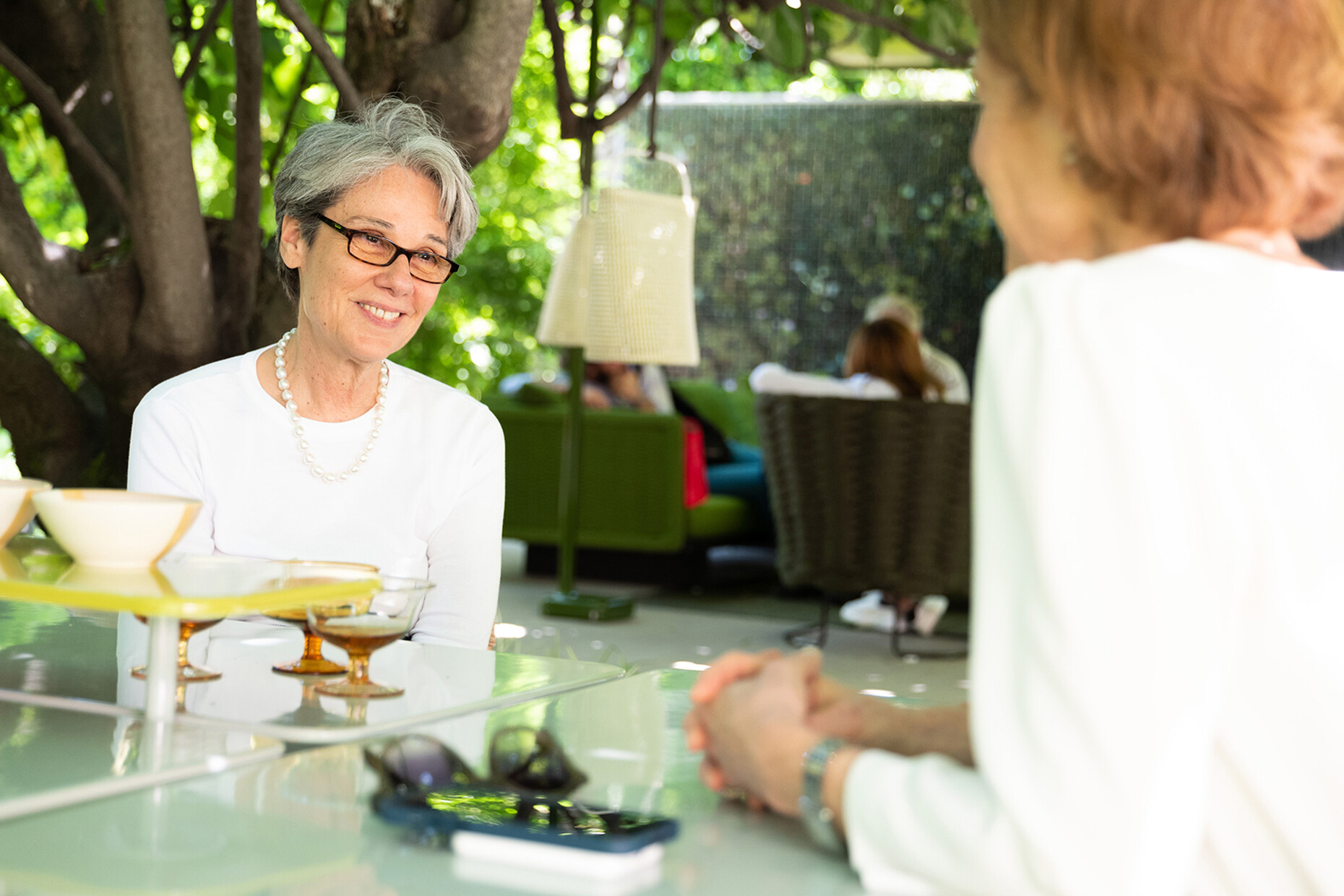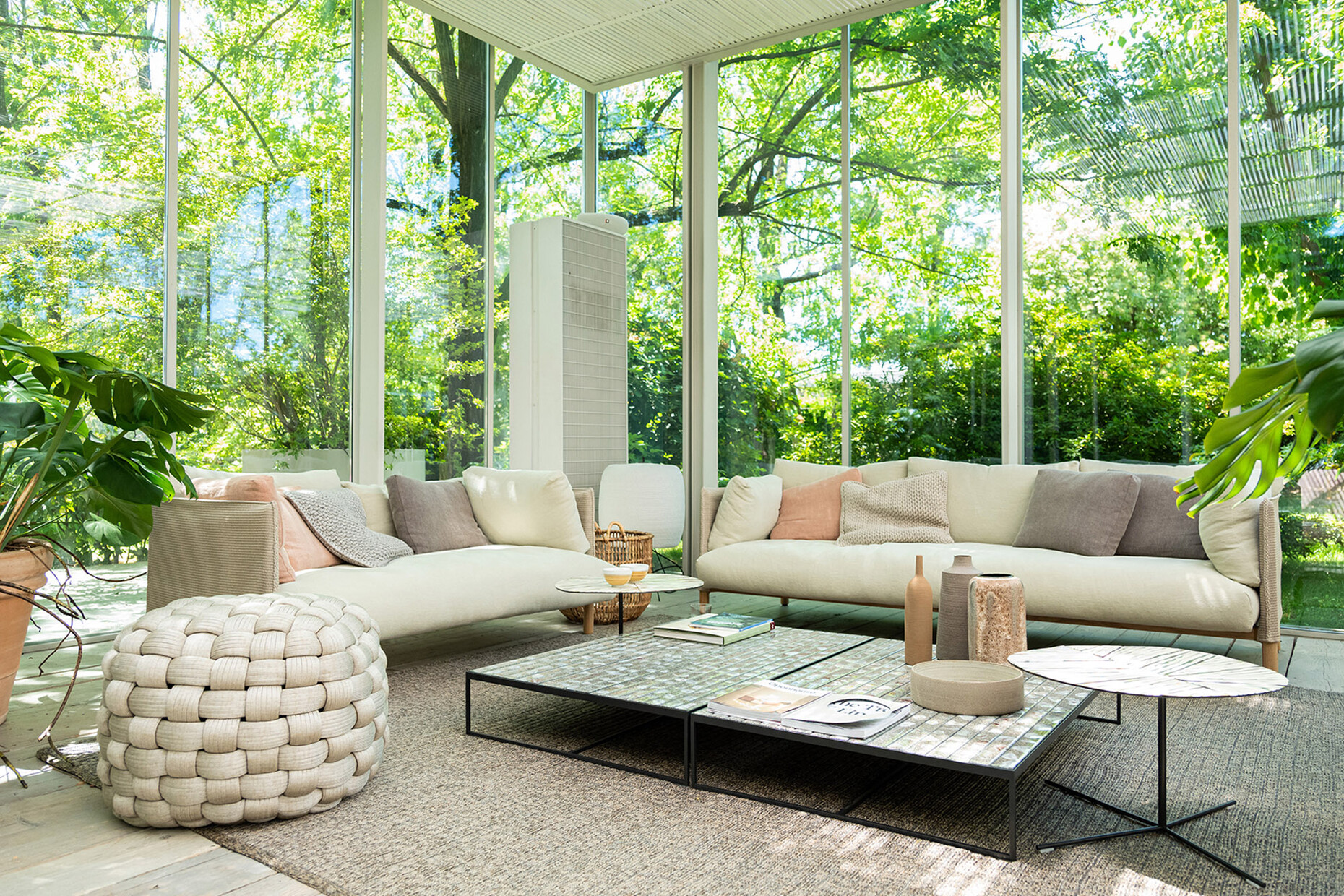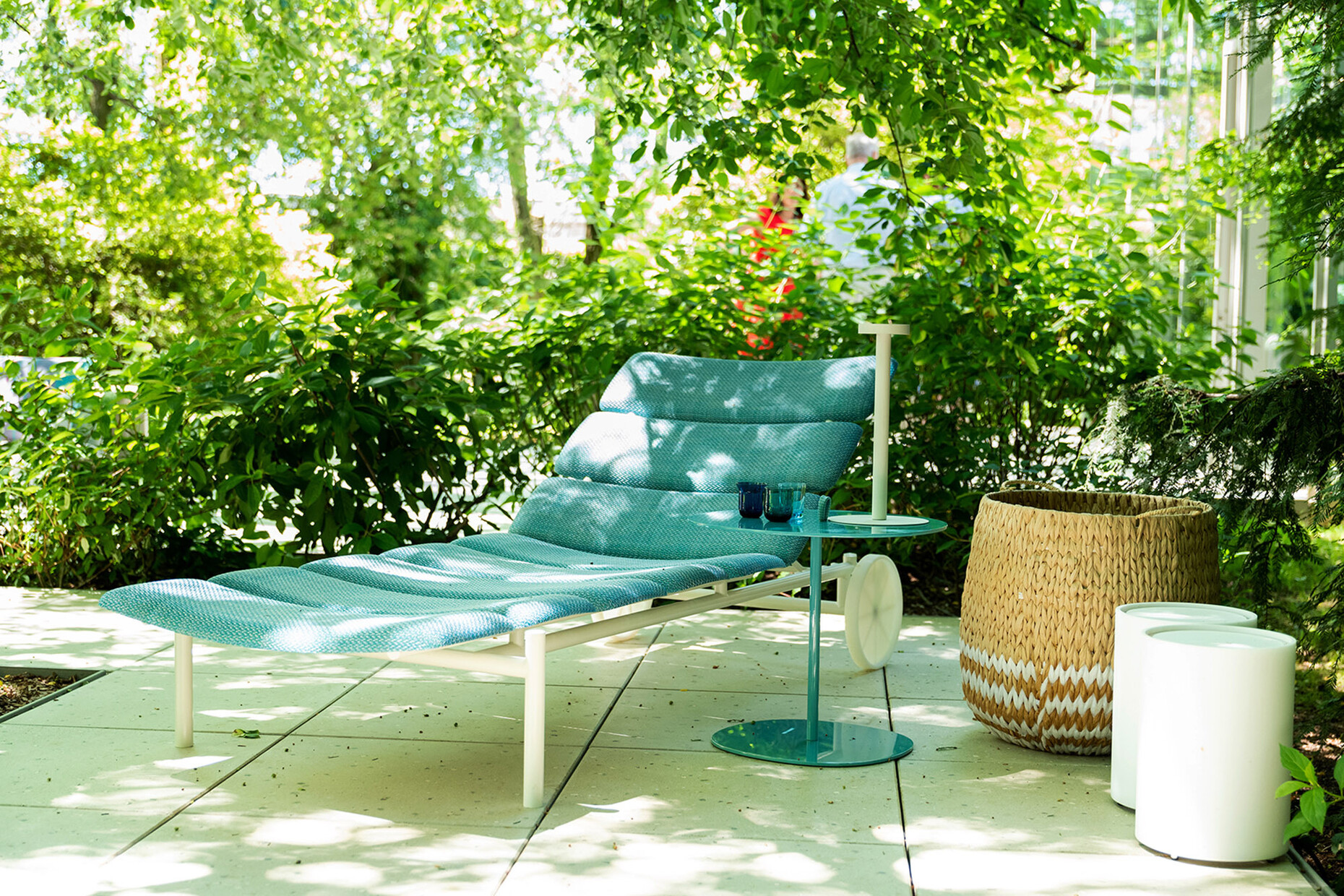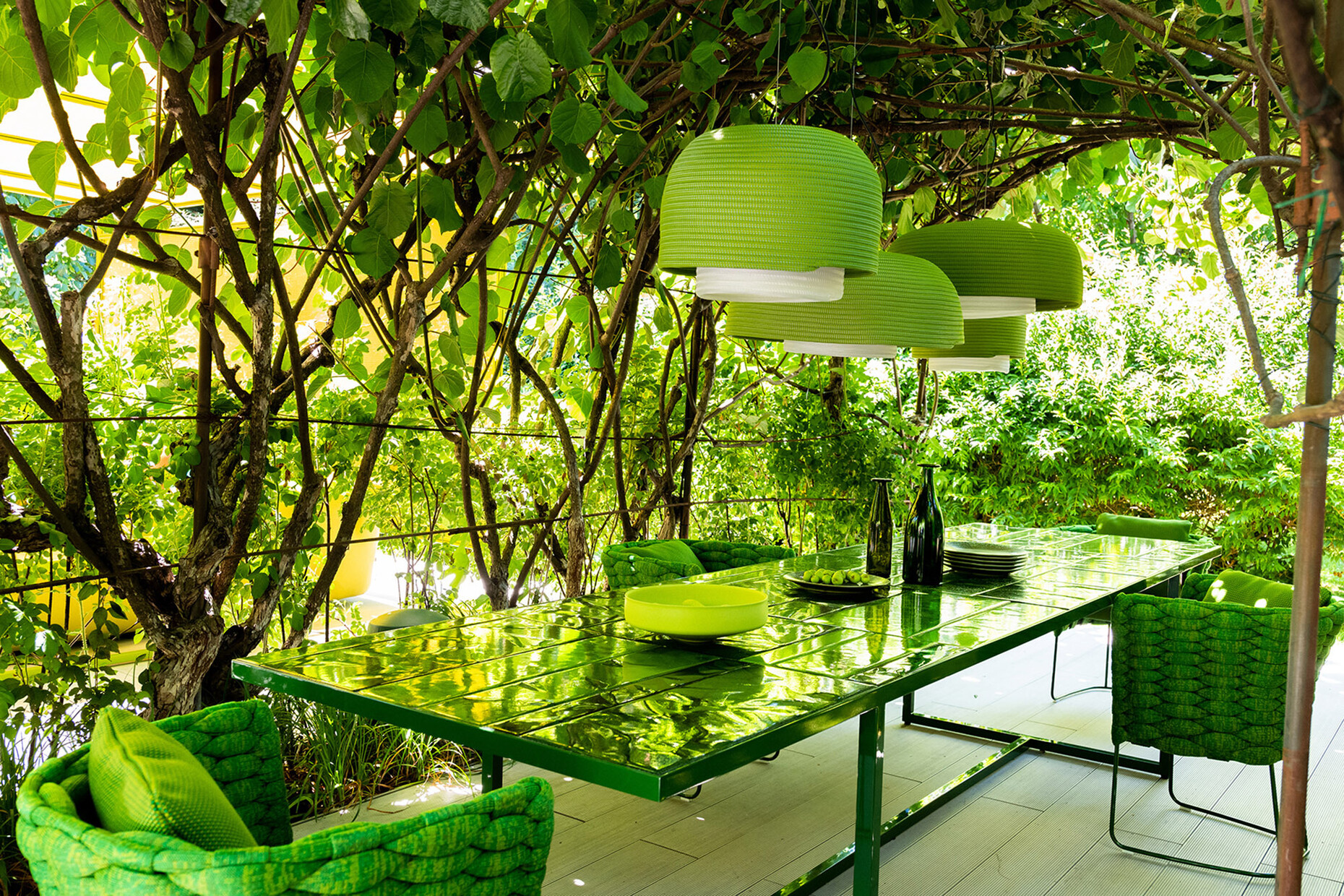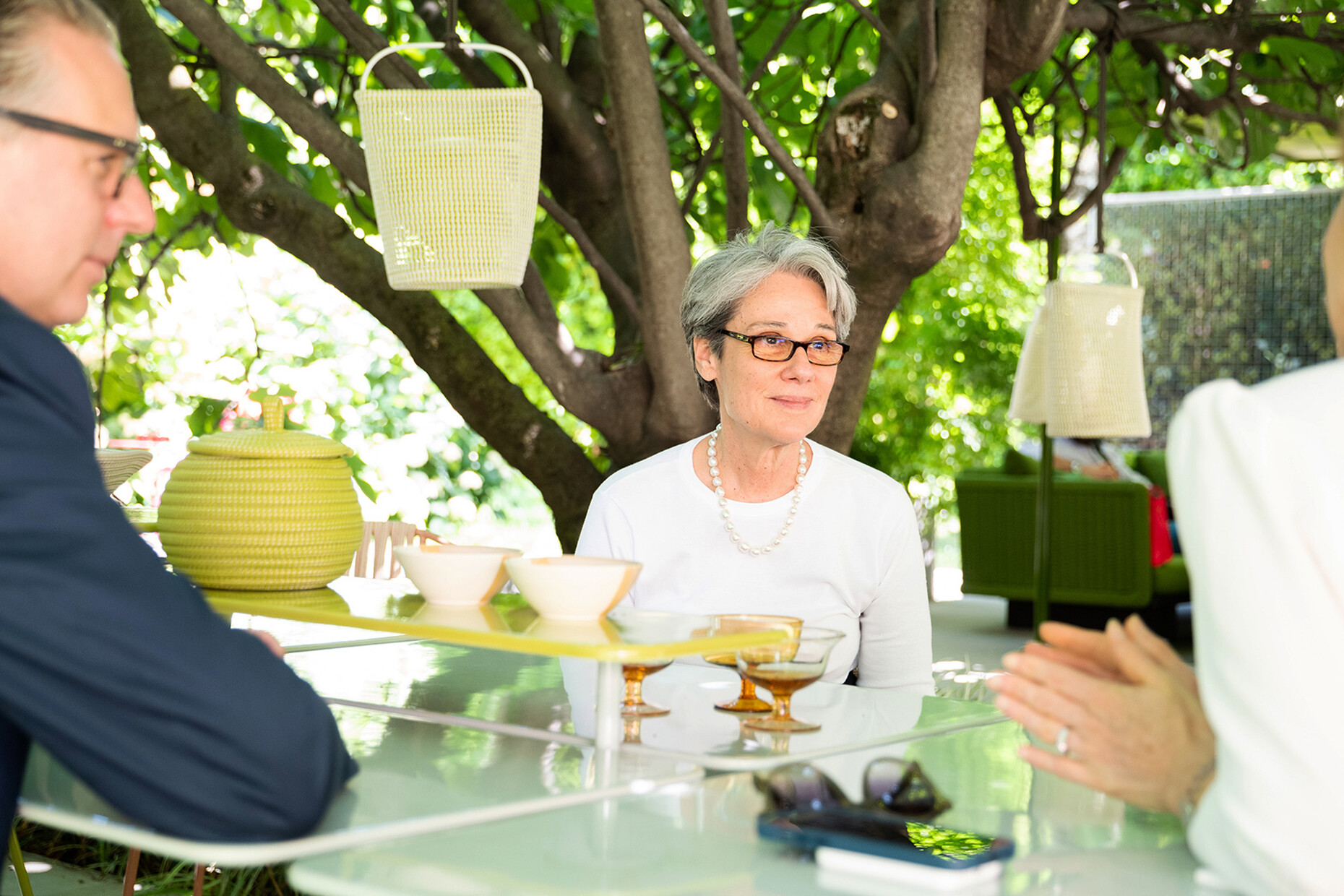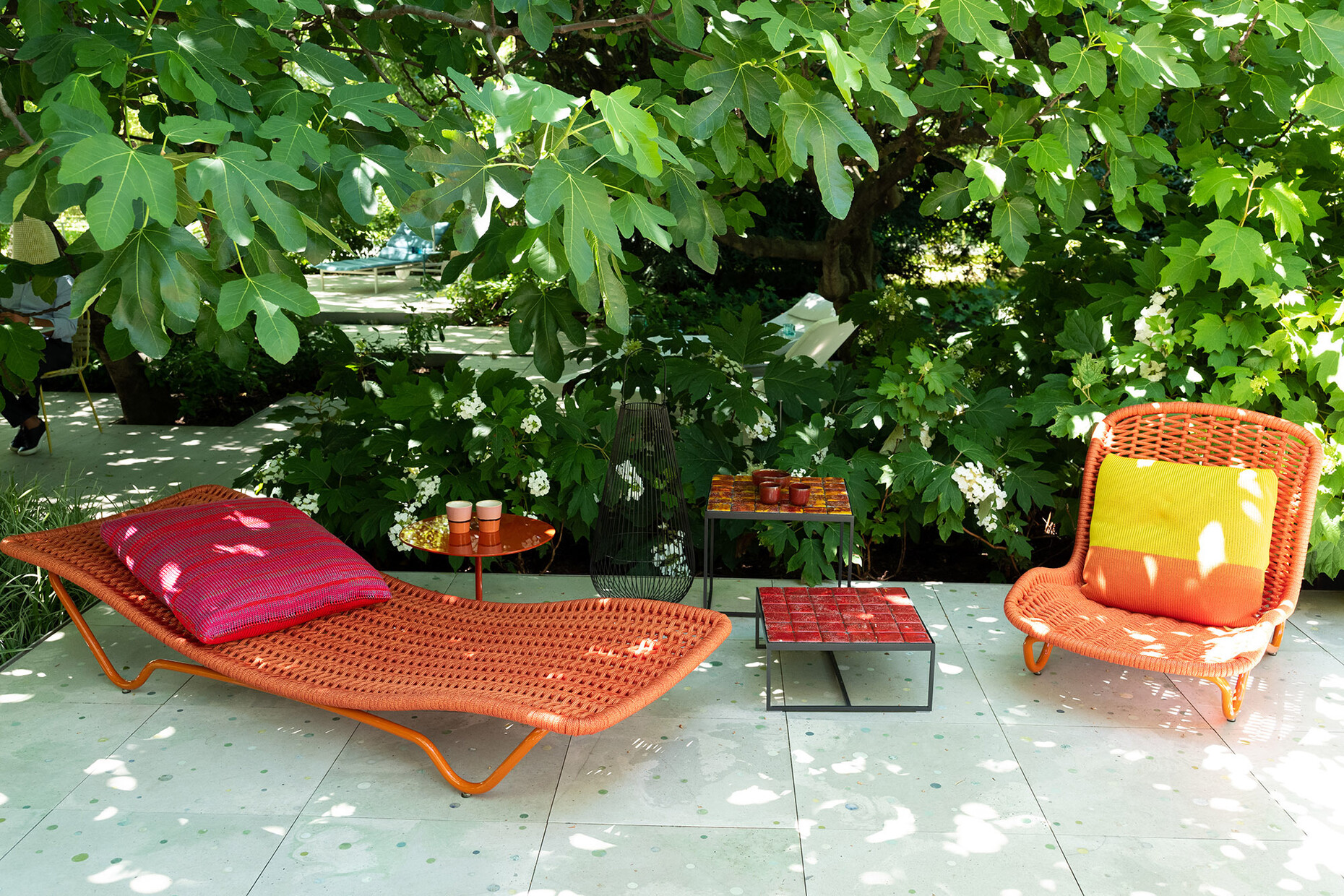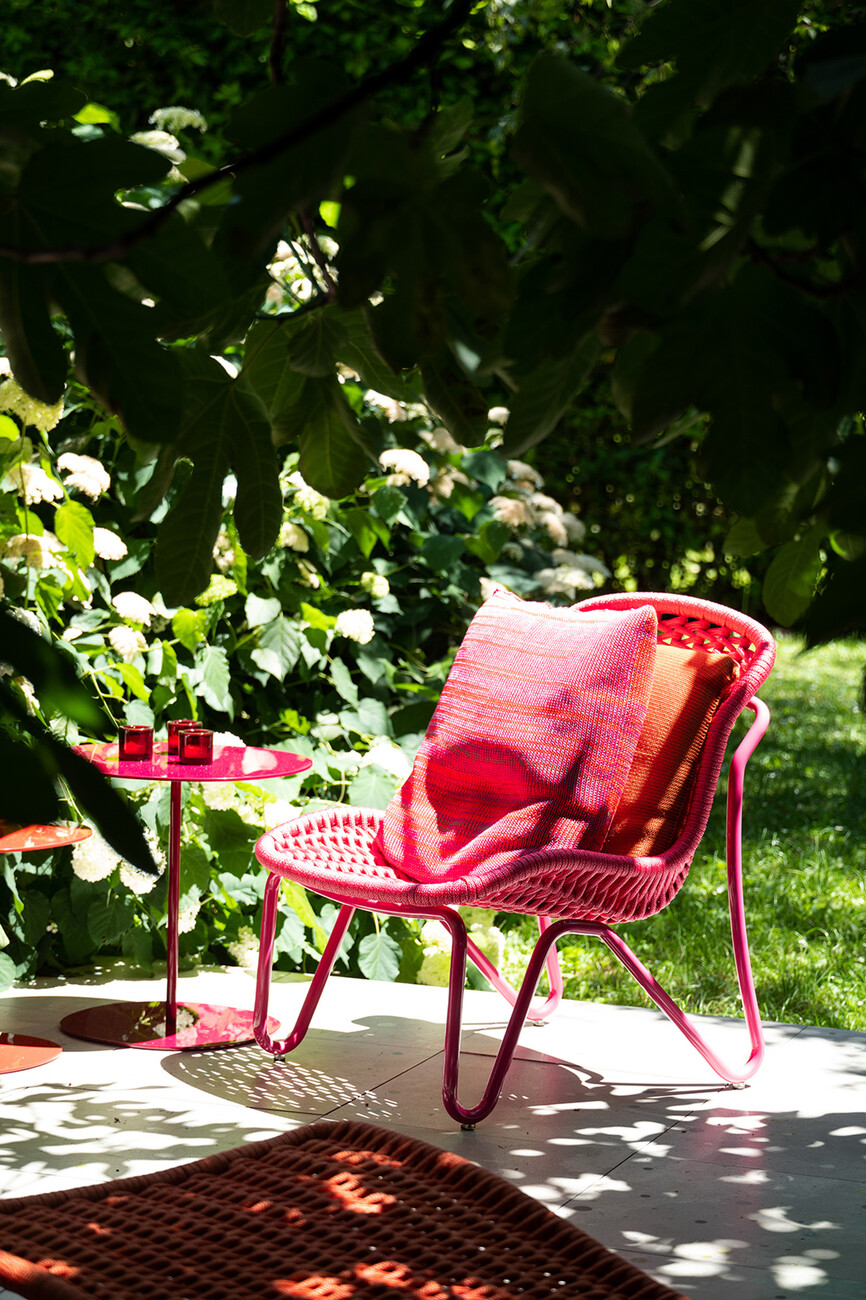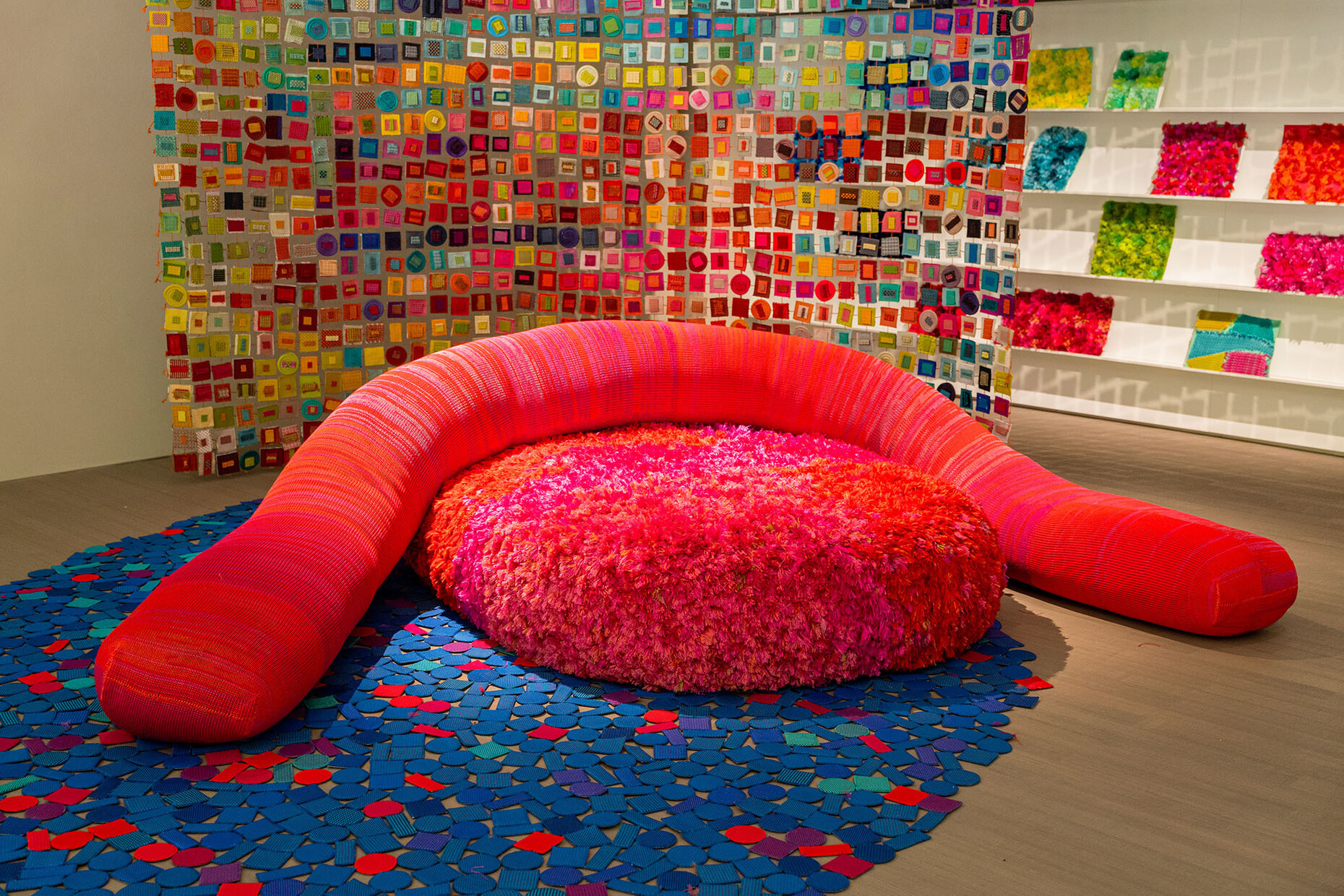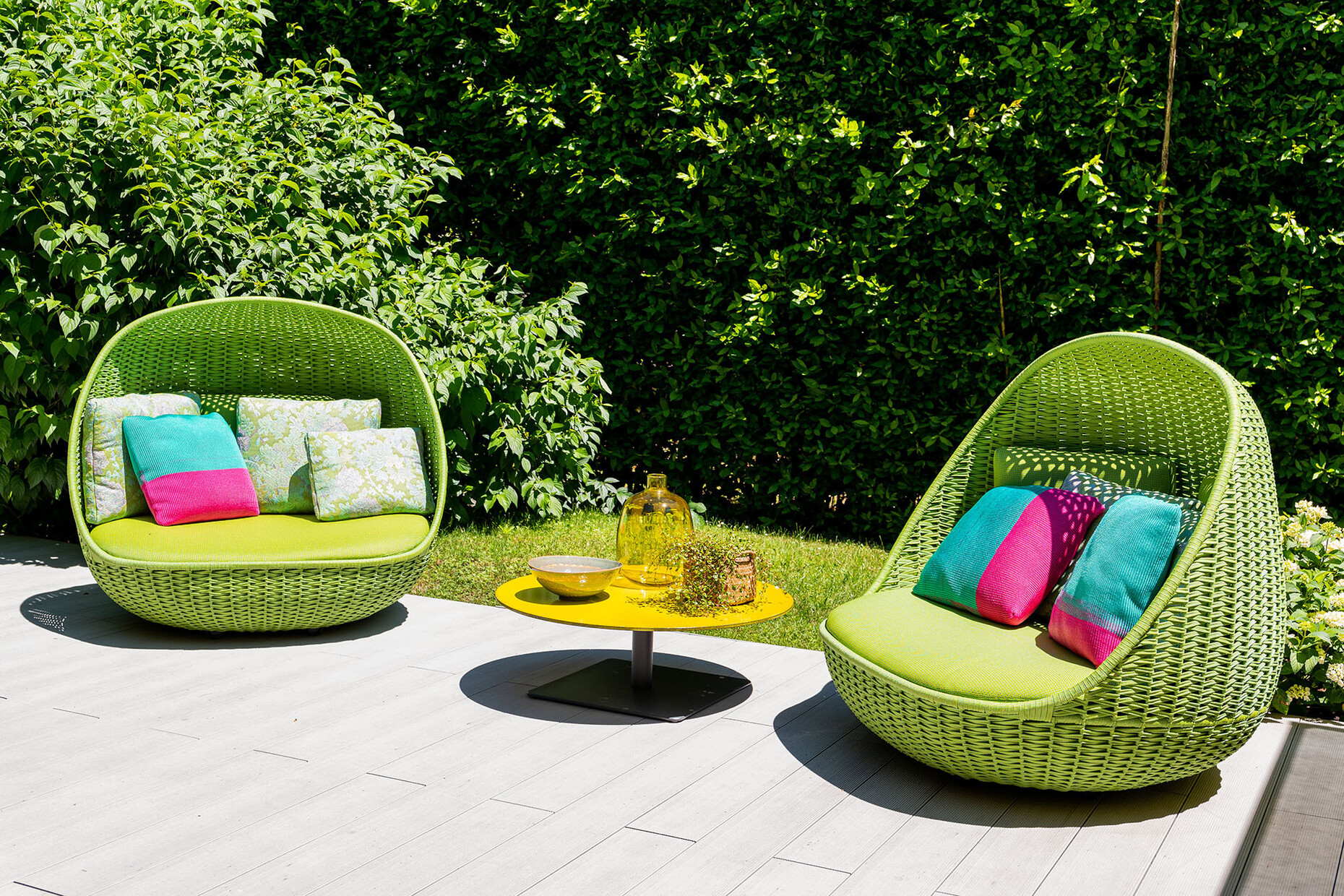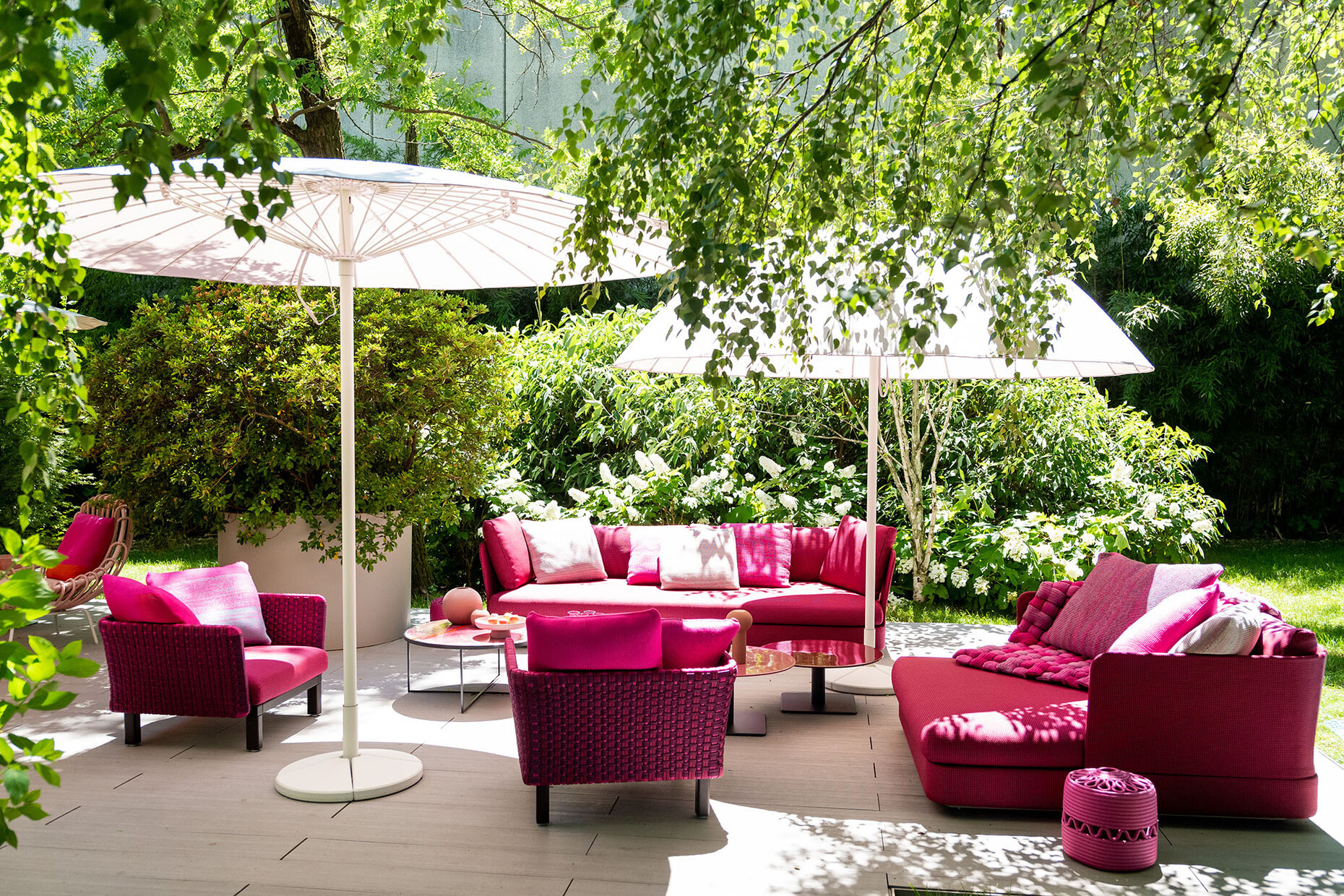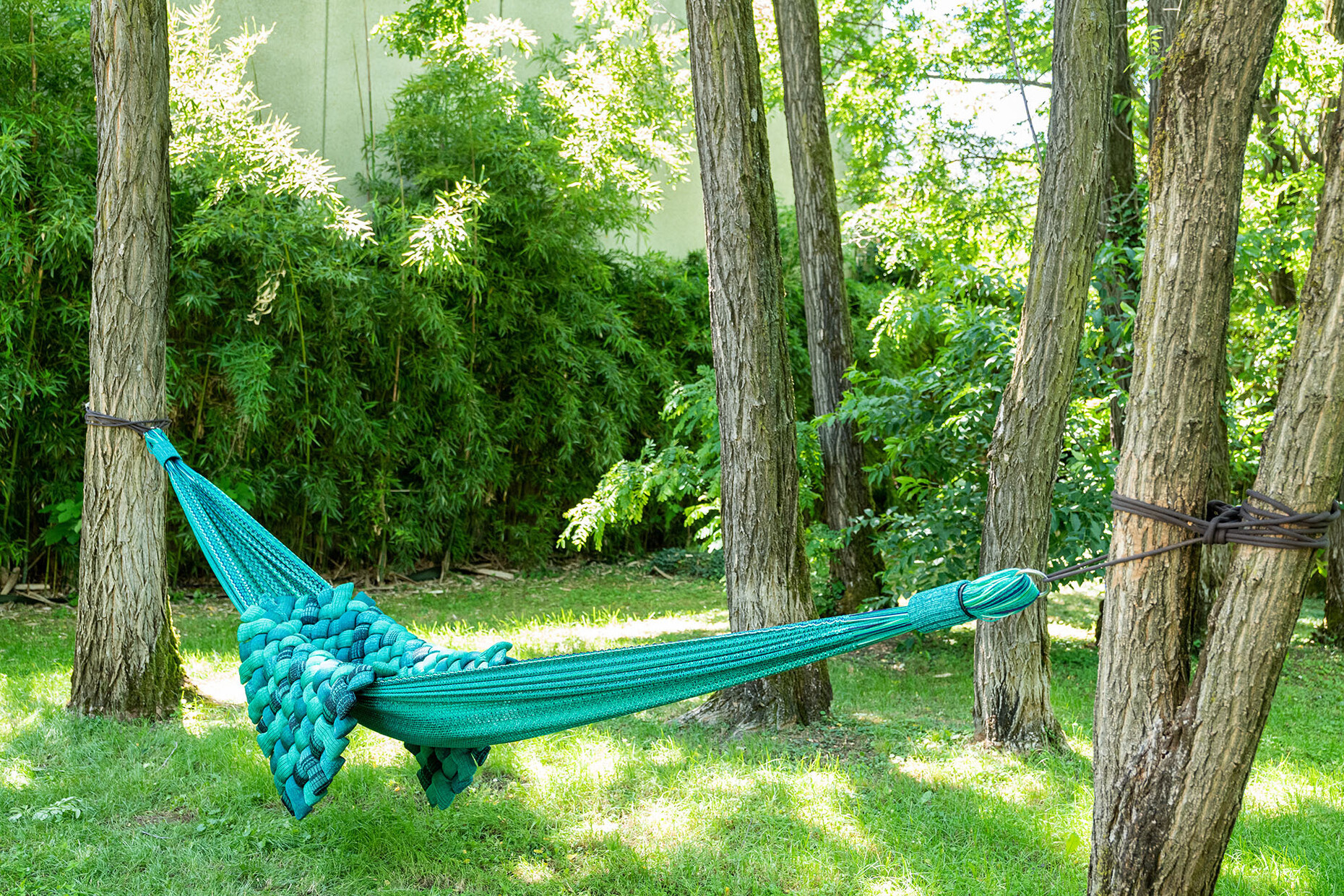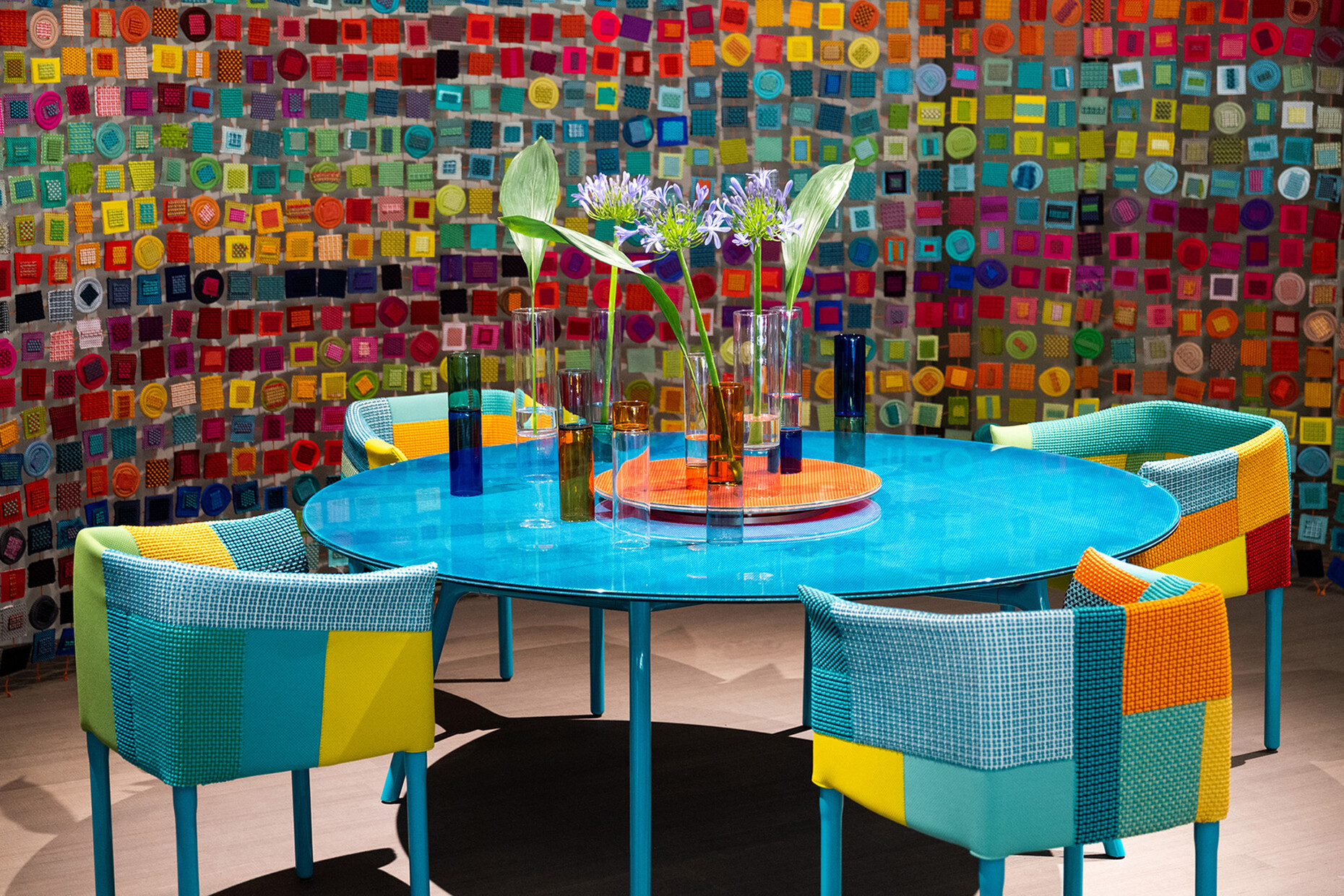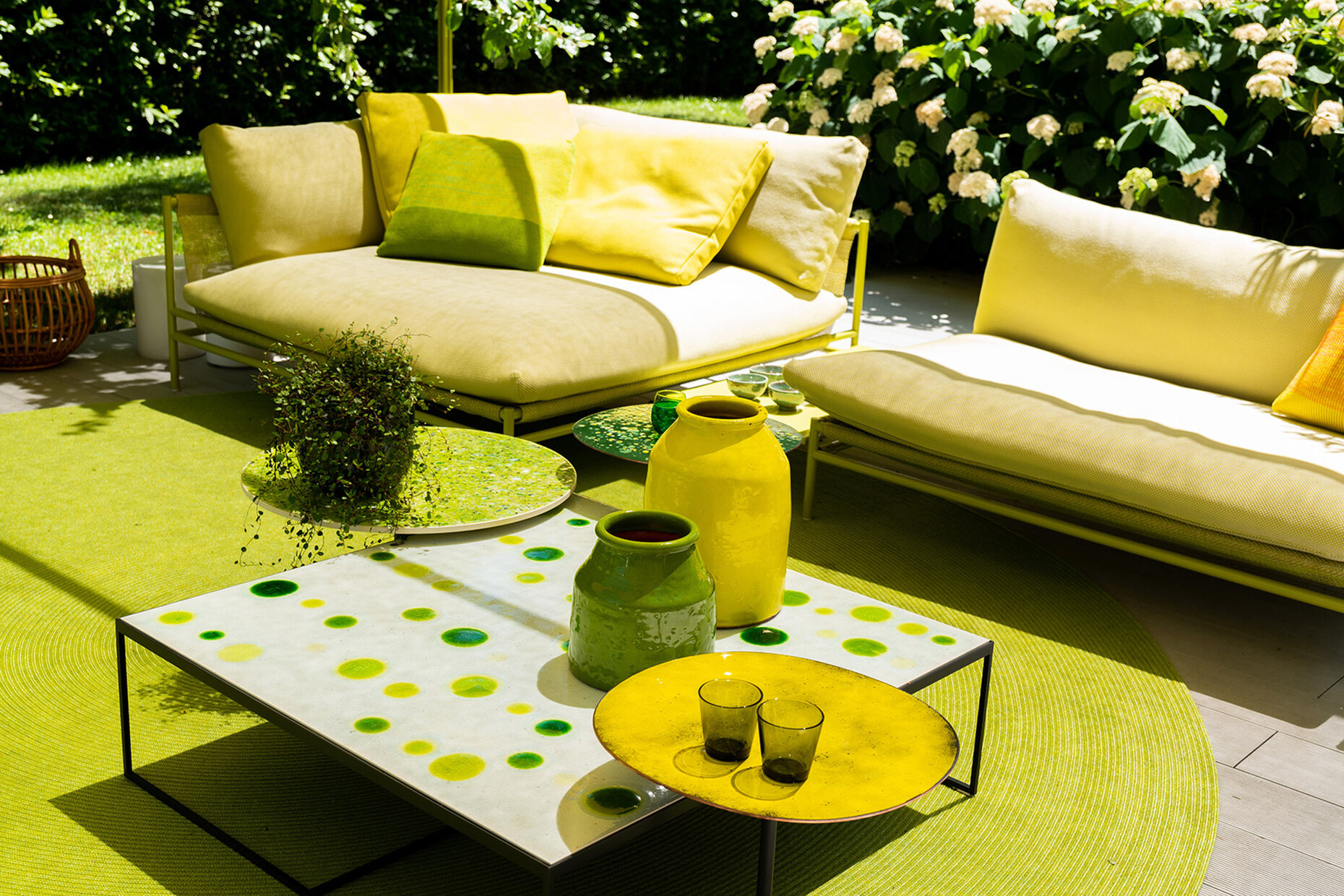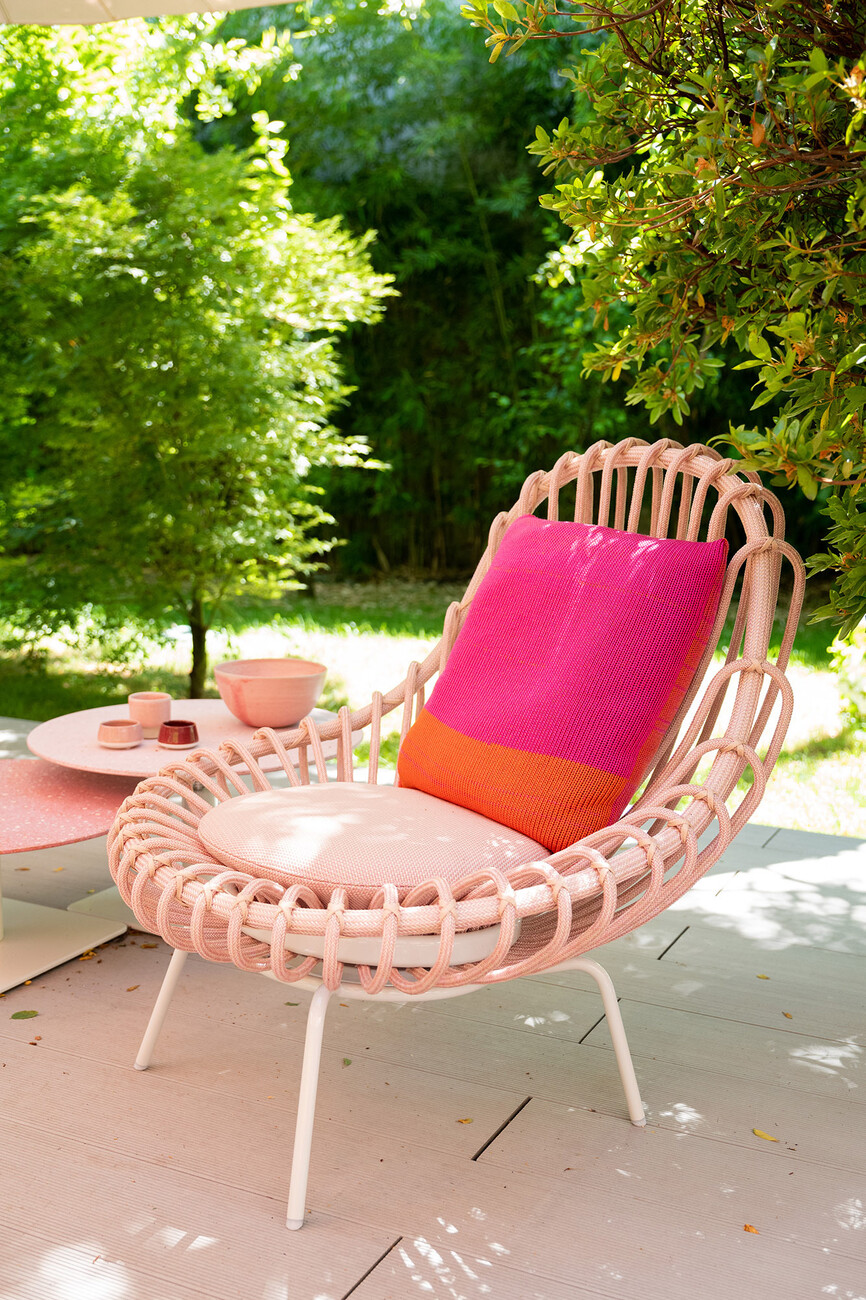Furniture for tomorrow
Franziska von Schumann: What is the advantage of your location in Meda? Why are you not present at the Salone del Mobile in Milan?
Paola Lenti: The choice of presenting our collections directly at our headquarters in Meda was definitely against the tide considering that for example the Fuorisalone traditionally takes place in the heart of the city, but winning: the feedback that we received from everyone – clients, designers and the international press – was incredibly positive this year. Our headquarters is surrounded by almost 27,000 square feet of landscaped grounds. Our indoor, glass-walled showroom space opens up to an expansive garden filled with fruit trees and lush greenery, so it offered the perfect setting for our new collections. Showing here also allows us to keep the installation open for several more months, which is something we wouldn’t have been able to do in a rented location.
Robert Volhard: Your products show a great willingness to experiment and research. What is it that appeals to you? Tell us more for example about the "Jardín" novelties and its unique historical background.
Paola Lenti: I have to admit I discovered the work of Clara Porset quite by chance. I was leafing through a book that contained some images of a beautiful collection that Porset created in the late 1950s and I immediately fell in love with the sinuous shapes of these chairs, designed low to sink into the sand by the sea. The idea of reinterpreting these seats in a contemporary way came at that precise moment. We started an in-depth work of recovery carried out with the collaboration of Professor Jorge A. Vadillo López, founder and curator of the Archivo Clara Porset at the University of Mexico (UNAM). I have to thank him because we have been able to create a collection which is incredibly beautiful and modern, without changing the original design. Our work focused primarily on the materials, updating the wicker weaves with our technical outdoor yarn Twiggy. The original bentwood structure is now in a gloss-varnished aluminum available in a range of exclusive colors.
Robert Volhard: Apart from being a pioneer in material research and sustainable thinking, we understand that Paola Lenti is also very much involved in social responsibility. Here in Meda you are presenting a wonderful project combining the reuse of material as well as social responsibility by giving back to the society. Please elaborate on this wonderful project.
Paola Lenti: In Paola Lenti, we’ve always believed that beauty should not and must not be separated from ethical responsibility and we have been acting following this principle. From there to include the social component in our projects, the step felt both natural and necessary. We recognize that while it may not be a generally recognized requirement, for us inclusion plays a very important role in any kind of sustainable and circular business model. If we want to be truly sustainable, we simply cannot ignore the ethical component, and we all must commit to reducing inequalities, as well as consumption. That’s how the "Metamorfosi"-project was born. We are reusing scraps coming from our yarns and fabrics in-house production to give them a new life. The result is a special edition of unique pieces, in balance between art and design. Five seating pieces and a tapestry made with the collaboration of the CouLture Migrante social tailoring atelier in Como, with the aim of providing an opportunity for work integration for women at risk of social exclusion. "Metamorfosi" is not a design collection, but a wider project proposing a more conscious use of raw materials and a renewed dialogue between innovation, craftwork and social responsibility.
Franziska von Schumann: Textile development was and is very important to Paola Lenti. What are you exploring in textiles right now? Does the need for sustainability push new dimensions, or has Paola Lenti not always been thinking sustainable and was actually a pioneer in this field of recycling material and acting sustainable since the very beginning?
Paola Lenti: Our commitment to ecological sustainability has been a foundational principle of the brand, and since its inception we have always searched for new ways to limit consumption, choose eco-friendly materials and production processes, and to favor local suppliers. Our unending material research, aided by scientists, researchers and professors from scientific institutes and universities, has allowed us to create materials that are beautiful, colorfast, durable and sustainable. Materials that don’t force us to choose between creating a beautiful space and protecting our planet.
Franziska von Schumann: You first worked as a graphic designer and freelance art director for fashion brands and then started designing your own glass and porcelain objects and felt rugs. To what extent has your graphic design training influenced you in product development?
Paola Lenti: After classical studies, I enrolled at the Scuola Politecnica di Milano where I met great masters: Munari, Ballmer and Garau, among others, that taught me a lot. At the end of these studies, I started to create small graphic works, but also to design set-ups for fashion companies where I used to add one-piece rugs custum-made felt. I was very young when I started working and I have treasured all that I have learned before. Youth experiences, you know, accompany our actions for the course of our lives. As for me, my studies have certainly led me to develop a particular attention to detail. This is where the desire to go deeper and deeper into things comes from: doing research, discovering the potential of the materials I work with, studying new shades of color. The attitude to constant improvement is the basis of my work and is certainly partly due to my training and partly to my character.
Robert Volhard: People and the environment are at the center of the design process for you. How does this show concretely in the development and production process?
Paola Lenti: I believe that the activity of a company must be nowadays seen within the environmental and social context in which it operates. Entrepreneurs must therefore act responsibly because their choices have direct effects on the territory and on people. They can be brave choices, for several reasons. Maybe they are economically expensive in the short term or they anticipate the markets. When we decided to launch the "Metamorfosi" collection, for example, we have activated a change of thought and a new logistic organization of the production and the warehouse in order to create an archive of scraps. Which is not easy at all! However, we felt it was necessary to take this step, which allows us today to produce a collection that is even more sustainable, both socially and environmentally.
Franziska von Schumann: You once said, "I can't remember ever seeing the world in black and white". As one can clearly see from your products, you are not afraid of color and also like to use very pop, intense shades like neon, pink, lime green, turquoise. How do you balance within your collections natural tones, as well as bright colors? What does Paola Lenti stand for – colorwise?
Paola Lenti: One of my earliest memories is that of me as a child playing with two sheets of colored paper, one blue and one orange. Two contrasting yet complementary colors. That was the first time I remember I understood that I could play with colors. It is hard to explain, but it's like before I get certain shades, I already picture them as real in my mind. This, of course, unless the color derives from the very nature of the materials: in this case, it becomes a fundamental aspect and a guide towards a precise direction. Nature is for us a source of inspiration and what we aspire to. Color is an essential part of our collections and the main distinguishing feature. The right harmony between shades, expertly combined with materials, can create comfortable environments where people love to spend their time, alone or in company.
Franziska von Schumann: Despite the high standards, handwork plays a big role at Paola Lenti, as it does with the rugs. Why is that important to you?
Paola Lenti: Human wellbeing is at the core of Paola Lenti mission. Each product is conceived to be welcoming and inviting, never protagonist. On the contrary it is designed to blend with harmony within the space, making it comfortable and aesthetically pleasant. In our philosophy, a living space must be functional to the people who inhabit them, enhancing their quality of life while stimulating positive thoughts that can only arise when you are surrounded by beauty. The use of traditional production techniques, such as handwork and hand weaving, goes to that direction of wellness. The objects become familiar and reassuring, as if belonging to our memory.
Robert Volhard: You are now increasingly producing furniture for interior design. What insights from outdoor design development have you been able to use for this?
Paola Lenti: The choice to launch an indoor collection has been a natural evolution considering that the company was initially born producing carpets and some small indoor seats. It was therefore a return to the origins, with a stronger experience gained while working for the outdoors. The research we have always done on materials, their properties and potentialities, allows us today to rely on exclusive fabrics and structures that offer the best outdoor performances. Our collection can live under the most extreme environmental conditions. It is not a coincidence that Paola Lenti is chosen to furnish many yachts all over the world. And if a piece of furniture is able to live under the sun, attacked by the wind and salt, it can only have an easy life indoor!
Robert Volhard: A broad spectrum, from the furnishing of yachts to the interior design of buildings – how do you manage this balancing act?
Paola Lenti: When we design we have only one goal: to create functional, aesthetically harmonious and performing environments that can bring well-being to the people who live there. When the goal is this, the intended use is irrelevant.
Franziska von Schumann: You founded the company "Paola Lenti" about 25 years ago. In which direction have you currently set sail for the future?
Paola Lenti: We have been striving for continuous improvement since our birth. We got more and more structured, becoming an internationally known company with an important percentage of exports. But did not forget our inspiring principles: we want to continue to be a made of people company, working in an ethical way in the light of an increasingly certified circular economy. We will work on multiple goals: to maintain the quality of life and work of our staff and to be able to create eco-sustainable products that use recyclable materials and that are recyclable in turn. Sustainability today, rather than a choice, is a moral obligation. It is in this perspective that we want to become better at working by subtraction, synthesizing to the maximum in order to recognize and avoid any form of superstructure. And therefore of waste.
